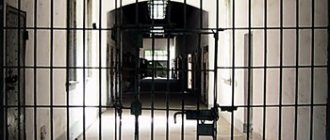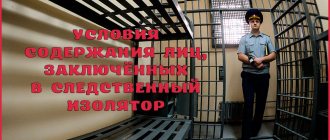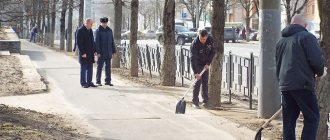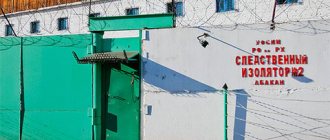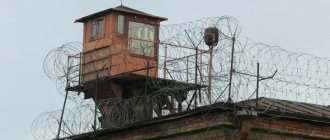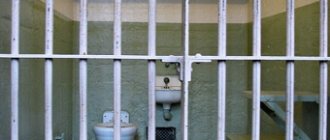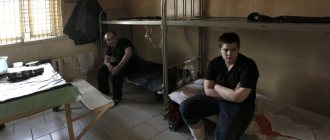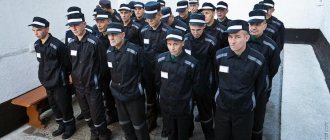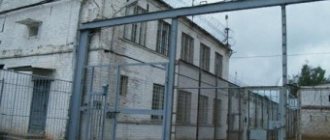Issues related to interaction with internal affairs bodies, especially when it comes to measures of procedural coercion, are quite complex for many citizens and, as a rule, without specialized education, it is quite difficult to understand them.
In practice, such legal illiteracy is often taken advantage of by unscrupulous police officers, exceeding their powers and not respecting the rights of detained and arrested citizens. In this regard, knowledge of one’s rights and the ability to defend them is extremely important for any person. This article will examine in detail what a detention center is in police departments, the grounds for placing a citizen there, as well as the time frame for which a person can be detained.
Description of the prison cell
The situation in temporary detention center cells can be very diverse. As a rule, in those of them that are located in departments of the Ministry of Internal Affairs, it is quite ascetic. The bullpen is a small chamber-type room, which is closed off from the surrounding space by bars. For this reason, people sometimes call such cameras “monkey cameras.”
There is practically nothing in the room, except for a small bench intended for the rest of the person contained therein. Sometimes there may be a toilet in the cell for bowel movements. There may be a window, which must be covered with bars.
Bullpen cells in police departments are designed to hold 1-3 people, but in practice this requirement is not observed. It is not uncommon to see overcrowded cells, where there are up to 10 or even more people in one room.
Cells in temporary detention centers where people serving administrative arrest are kept look somewhat different. As a rule, such premises are intended for several people. The cell has sleeping places, bed linen, benches and a table where prisoners can eat.
Reference! In addition, there is a toilet, which, as a rule, is not separated from the main space of the room. The entrance to the cell is closed by an iron door, where there is a closed hole through which food and parcels are delivered to the arrested. There is also a barred window.
Main
The Ministry of Internal Affairs system has in its jurisdiction special detention centers, which are used by law enforcement officers to temporarily isolate persons suspected of committing socially dangerous acts. As a rule, they are located right in the basement of the police department. Now they are called temporary detention centers (temporary detention centers). Although previously they had a different name - bullpen. Almost all citizens of the older generation know the definition of this term. After all, pre-trial detention cells in the USSR were those places where alleged criminals were detained. For this reason, young people who are wondering what a KPZ is should know that it is an old name for a temporary detention center for suspected criminals.
In addition, it must be remembered that temporary detention facilities cannot be used for permanent detention of prisoners. For this, there are other special institutions (pretrial detention centers), which are part of the system of institutions of the Federal Penitentiary Service.
Rules of stay
The pre-trial detention cell is not part of the institutions administered by the Federal Penitentiary Service , in other words, they do not belong to the penitentiary system. This is quite obvious, since the persons held there are not suspects or accused of committing a criminal offense.
However, it should be understood that a temporary detention facility is a security facility, and staying in it implies a significant loss of rights.
Thus, citizens are kept in custody in the detention center. This means that they cannot voluntarily leave this premises by going beyond its boundaries. In addition, they are under constant control of police officers. Exit outside the cell is possible only by agreement with them.
As a rule, you can go to the toilet (if there is not one in the cell), to the room for meetings with relatives or a lawyer, and also to talk with the investigator. All movements are possible only with a responsible police officer.
Upon admission to a temporary detention facility, a citizen is required to hand over all valuables. The police officer draws up a corresponding inventory.
Valuable items include:
- money;
- Jewelry;
- Cell phones;
- gadgets and other equipment.
After leaving the temporary detention facility, things must be returned to their owner. However, in practice, situations occur when unscrupulous police officers try to appropriate part of the detainee’s property. To prevent this from happening, you must carefully ensure that valuable items are included in the inventory in full.
Temporary detention facilities may accept parcels for persons held there from relatives. However, there are certain restrictions. Thus, during the entire period of stay you can transfer no more than 30 kg of food and belongings. As a rule, food (with the exception of perishable goods and alcohol), cigarettes, and basic necessities (clothing and hygiene products) are transferred to the bullpen.
It is highly desirable that the products are without original packaging, however, in some cases, police officers may accept packaged ones.
Attention! Under no circumstances should you transfer narcotic or psychoactive substances in an attempt to hide them in a food package. Police officers must check the transfers and if something prohibited is found, the sender may be prosecuted.
It is also possible to transfer medications to the bullpen. However, staff will only accept them if the detainee has a medical need to take them. It is best to have a prescription from your doctor with you.
Conditions of detention in the bullpen
A temporary holding cell is not a prison. Despite this, the general conditions of detention here are very similar to those of a prison. Here are some basic conditions of detention:
- The camera is relatively small in size.
- There are bare, painted concrete walls and there are no rest benches at all.
- It is allowed to leave the boundaries of the detention center if you want to go to the toilet, if the person is kept in the appropriate type of bullpen. A trip to the latrine is carried out exclusively with an accompanying person.
- If relatives come to visit the arrested person, the prisoner and the convoy are redirected to a room for such meetings.
- Exit from the cell is possible for an investigative experiment. The prisoner leaves accompanied by an escort.
- Meetings with investigators and lawyers are also held outside the bullpen.
The rest of the time the person is behind bars. Feeding here is carried out according to the schedule established by the regime.
Terms of detention
According to the general rule, which is established by the Code of Criminal Procedure of the Russian Federation, the period of stay of a citizen in a pre-trial detention cell should not be more than 48 hours, that is, two days. During this period, the official conducting the investigation must thoroughly verify the involvement of the detainee in the commission of a crime, as well as decide on a preventive measure.
If the latter involves detention, the investigator or inquiry officer submits a corresponding petition to the court. After 48 hours, the detained citizen is sent to a pre-trial detention center or released.
This period begins to run from the moment the person is actually detained, which must be reflected in the protocol.
In some cases, the period of detention may be extended. The maximum extension period is 72 hours. However, such a decision can only be made by a court.
In temporary detention centers where persons sentenced to administrative arrest are kept, the length of their stay is determined by the court. In this case, the corresponding period cannot exceed 15 days.
Important! The period of administrative arrest is calculated from the moment the person is detained, and not from the moment the court makes a decision to bring him to justice as provided for by the Code of Administrative Offenses of the Russian Federation.
Types of bullpen
There are three main types of holding cells. The first is perhaps the most common; these can be seen in the regional departments of the Ministry of Internal Affairs. As a rule, this is a small cell with bars, in which there is a bench for freshly minted criminals. Such premises are not intended for long-term housing of a person, since they do not have amenities.
The second type of detention center is intended for a longer stay of the detainee. This type of cell is a closed room with a grille for negotiations. They have a bed and a bathroom.
The third type of pre-trial detention cells is as close as possible to a pre-trial detention center. They have a strong door with several locks, bunk beds, a bathroom and a table for eating. Cells of this type are intended for those detainees who will soon be sent to a pre-trial detention center.
Atmosphere in the chamber
Despite the fact that the legislation of the Russian Federation is quite progressive, in practice, the norms and rules for detaining persons in temporary detention facilities are selectively observed, and the detainees themselves experience enormous emotional and physical stress. As a rule, police officers put pressure on citizens in order to obtain the necessary testimony.
There are also frequent cases when police, in exchange for compensation from the detainee, allow certain relaxations of the detention regime. Police officers rarely use overt physical violence against detainees and, as a rule, such cases receive public outcry.
In addition, most often citizens are kept in a general cell rather than in solitary confinement. In this regard, conflicts often arise between them, which, however, rarely end in fights.
Separately, mention should be made of the possibility of ending up in a cell with professional criminals or “thieves.” These people live by their own unwritten rules - “concepts”, which for an unprepared person can turn out to be chaotic and difficult to follow.
Reference! For actions and words that do not correspond to the “concepts”, punishment may follow from the “thieves”. In this regard, it is best for an ordinary citizen who finds himself in a prison cell relatively by accident not to have any communication with professional criminals in principle, and if it does occur, then he should carefully monitor his words and actions.
Differences from pre-trial detention centers
Let us note that the detention center (temporary detention center) has nothing in common with the pre-trial detention center (SIZO). These are completely different systems. A pre-trial detention center is a place of detention, a penitentiary institution where the isolation of the following persons is ensured:
- Persons under investigation (who are under investigation and awaiting a court decision).
- Defendants (already on trial).
- Convicts (those who are awaiting escort or are in transit in a pre-trial detention center - to be sent to correctional, educational colonies, settlement colonies).
- Detained and awaiting extradition.
Unlike the bullpen, the pre-trial detention center is under the jurisdiction of the Federal Penitentiary Service (FSIN).
What are the rules for keeping citizens
When an accused citizen (person), who is in a similar institution for a given period of time, will not have a qualified defense as a pre-trial detention cell. In this case, this is fraught with various negative consequences, which may arise when the case is considered in court. Any citizen has legal grounds to carry out his own defense through the use of the professional services of experienced lawyers. This is stated in the current rules that relate to these issues and must be followed.
Proper consultation with a lawyer on various cases provides an excellent opportunity to avoid being in institutions such as a pre-trial detention center on the basis of laws. Also, almost all citizens who, for certain reasons, are in these institutions on an ongoing basis require legal assistance from an experienced and competent lawyer. Citizens in most cases will need the protection of an experienced lawyer when considering their own cases in court. Therefore, in order to reliably and timely protect your interests at a high quality level in court, you will need to ensure in advance that the defense is represented by an experienced lawyer who knows how to work on various types of cases.
A full or partial search in a pre-trial detention center is carried out by a thorough examination of the entire body of the citizen being searched, his clothing, as well as existing prostheses. Citizens and accused persons are asked to undress completely and expose the required areas of the body. Various kinds of stickers, plaster and other dressings are checked together with a medical worker. All this is specified in the current rules that relate to these issues and must be followed.
When items sewn into clothing are identified, it is ripped open. Specialized instep supports and various heels, which are made of various metals, are removed from the removed shoes. In institutions such as pre-trial detention centers, prisoners who have been sentenced to imprisonment by a court decision may simultaneously be housed or transferred by court decision in order to take a certain part in the ongoing investigation procedures or cases, as direct witnesses.
If a citizen, during a given period of time, who is in an institution of this kind, such as a pre-trial detention center, does not have qualified protection, then this is fraught with various negative consequences, which may arise when the case is considered in court. Any citizen has legal grounds to carry out his own defense through the use of the professional services of experienced lawyers. This is stated in the current rules that relate to these issues and must be followed. Therefore, such moments in this institution take place on a completely permanent basis and are carried out within a strictly specified time frame.
In the future, this kind of information will be transmitted by radio, during direct visits to specialized cells by official workers, as well as during personal examination of suspects and accused by the head of the pre-trial detention center and officials
Here it is important to choose a consultation with a lawyer in various cases, which provides an excellent opportunity to avoid being in institutions on the basis of laws. Also, almost all citizens who, for certain reasons, are in these institutions on an ongoing basis require legal assistance from an experienced and competent lawyer
Almost all citizens who, for certain reasons, are in these institutions on an ongoing basis require legal assistance from an experienced and competent lawyer. Citizens in most cases will need the protection of an experienced lawyer when considering their own cases in court. Therefore, in order to reliably and timely protect your interests at a high quality level in court, you will need to make sure in advance that the defense is represented by an experienced lawyer who knows how to work on various types of cases. Citizens in most cases will need the protection of an experienced lawyer when considering their own cases in court. Therefore, in order to reliably and timely protect your interests at a high quality level in court, you will need to make sure in advance that the defense is represented by an experienced lawyer who knows how to work on various types of cases.
Important! For all questions related to the pre-trial detention center, if you don’t know what to do and where to go:
Call 8-800-777-32-63.
Or you can in any pop-up window, so that a lawyer on your question can answer and advise you as quickly as possible.
Regime of detention and rights of the detainee
A bullpen is a cell in which a detainee spends the bulk of his time, but there are a number of cases when a subject held in a cell can leave it: a meeting with a lawyer, a daily walk if there is an equipped area, a meeting with loved ones or relatives with permission from the authority inquiries or investigations, taking a hot shower or bath, participation in investigative activities.
The activities of temporary detention facilities require different modes of detention: there are distinctions regarding the joint detention of subjects. Men and women who have been convicted and are under suspicion of committing a crime, those who have committed an offense for the first time and repeat offenders, criminals and government officials, those who are involved in the same criminal case or related cases should not be together. In addition, subjects who are suspected of committing serious crimes are also subject to separate detention in temporary detention facilities. If there is a corresponding order from the prosecutor, a mother with an infant may be in the temporary detention center - in this case, special conditions will be organized.
Receiving transmissions
As for transfers, their number is not limited, the main thing is that two conditions are met: the list of things and items sent should not include prohibited items, and the total weight should not exceed 30 kg, but the last point does not apply to a number of categories of detainees. These include minors, pregnant women or women with an infant, as well as those with a serious illness.
Upon acceptance of shipments, they are weighed and inspected. Those persons who are charged with being kept in a punishment cell due to their behavior are prohibited from receiving parcels during this time. When visiting with a lawyer or relatives, accepting things is not allowed.

